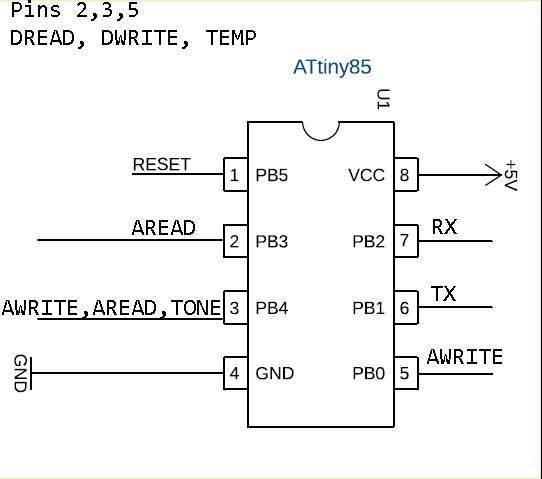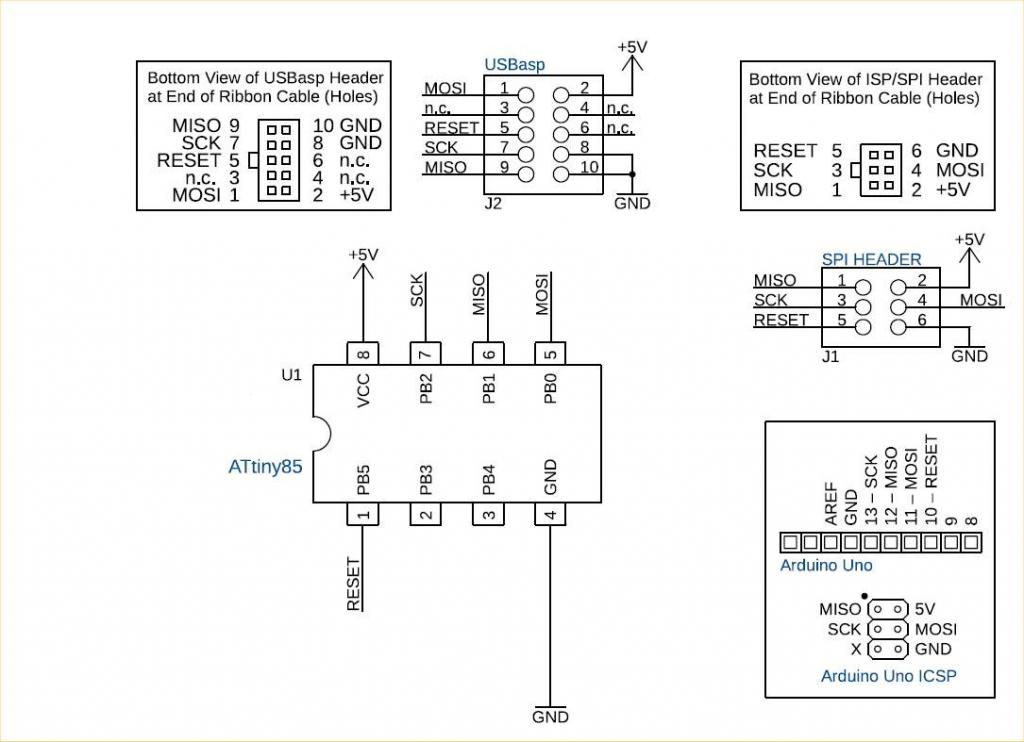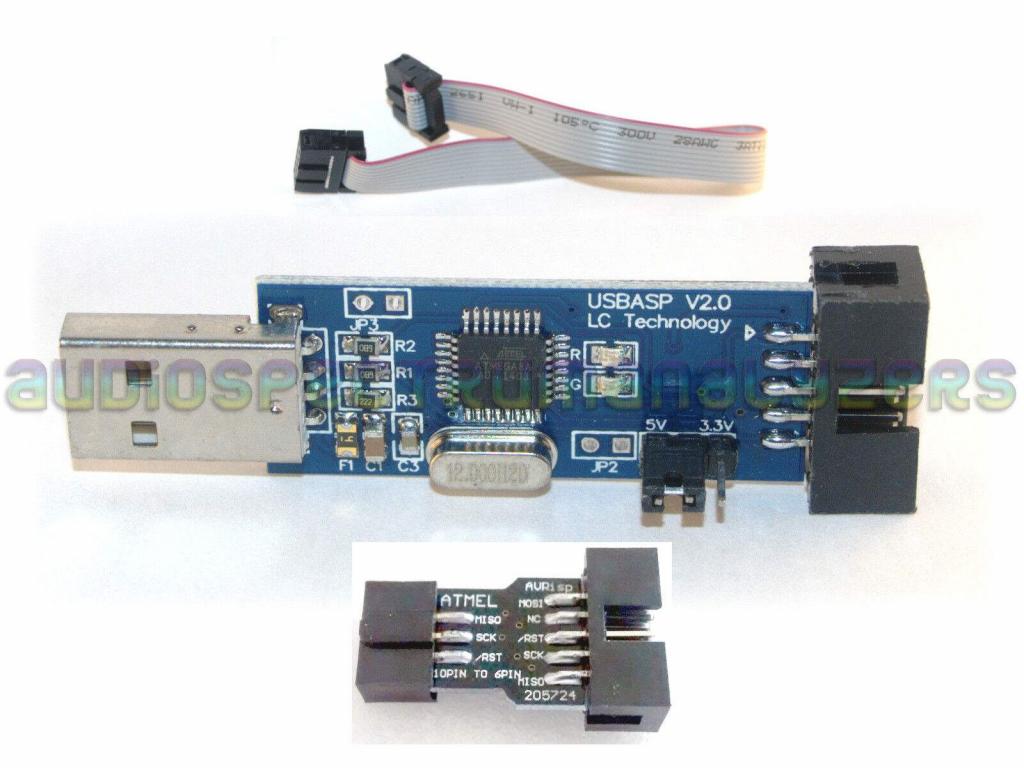
|

|
Forum Index : Microcontroller and PC projects : TinyBasic for the ATTiny85
| Page 1 of 4 |
|||||
| Author | Message | ||||
| matherp Guru Joined: 11/12/2012 Location: United KingdomPosts: 9126 |
Attached is a release of TinyBasic for the ATTiny85 ATTiny85.zip See here for basics of the language and from where I copied the core code I found code for the TONE command and TEMP function here Bits of the Arduino ATTiny core were "acquired" to help with I/O from here The code was compiled using Microchip Studio I wrote the software UART and put it all together (difficult bit was supporting Ctrl-C). NB: you cannot paste code into the terminal window as the character echo from the previous character is blocking. The code uses 8075 bytes of 8192 available. ENJOY Source code ATTinySource.zip Differences from the documented version of TinyBasic are: For all pin based commands use the physical pin number as the argument TONE command TONE note, octave note is a number between 0 and 11 octave is a number between 1 and 11 TEMP function TEMP(pinno) WAIT command WAIT usecs The pinout of the ATTiny85 is as below:  Connect a USB-UART to pins 6 and 7 to communicate with the ATTiny85. The baudrate is fixed at 38400. You then have three user pins to use for the functions and commands as shown. The chip is programmed to run at 16MHz. Note that pin 1 could in theory be made available as an I/O pin but that requires setting a fuse and the chip could then not be re-programmed with an Arduino or USBASP. To program the ATTiny85 you will need a USBASP (ebay) or a suitable programmed Arduino. Connect the chip as below.  You will then need to download the AVRDUDE software. Assuming the hex file is in the same directory as AVRDUDE, the command to program the chip is: avrdude.exe -B 125khz -p t85 -c usbasp -P usb -U lfuse:w:0xf1:m -U flash:w:"attiny85.hex" Note: this sets one of the fuses in the chip to allow 16MHz operation (-U lfuse:w:0xf1:m). I presume the command will need to be modified slightly if you are using an Arduino to program the chip. USBASP programmers are very cheap  Edited 2023-07-25 22:28 by matherp |
||||
| Volhout Guru Joined: 05/03/2018 Location: NetherlandsPosts: 4246 |
bug fixes I also have a more recent version that shows line number at stop (CTRL-C). Let me see if I can find back the source. Good that you did not use Arduino to compile. With each new Arduino release the compiler optimizes different. EDIT: maybe this is usefull TinyBasicUno_v0_20_rc2.zip I also made a version specific for the 4 squares program that had 8 level deep stack (normal is 6 level deep) and a version for the STM32F103 (bluepill) missing the EEPROM save and load, and missing SERVO. Edited 2023-07-25 23:43 by Volhout PicomiteVGA PETSCII ROBOTS |
||||
| matherp Guru Joined: 11/12/2012 Location: United KingdomPosts: 9126 |
Sorry bug in the hex file ATTiny85.zip Now updated with many of Volhout's changes Edited 2023-07-26 03:58 by matherp |
||||
| Sasquatch Guru Joined: 08/05/2020 Location: United StatesPosts: 362 |
Ok, I have tiny85 basic mostly working! I haven't figured out how to save the program to EEProm the MEM command reports: 246 bytes free 512 EEProm bytes total. 1 EEProm bytes available. The default state for the EEProm is filed with 0xFF I tried filling the EEProm with 0x00 but with the same result. What am I missing??? -Carl -Carl |
||||
| Sasquatch Guru Joined: 08/05/2020 Location: United StatesPosts: 362 |
I notice that when running the following program the Tiny85 is unresponsive to CTRL-C it usually responds after repeated attempts or pressing CTRL-C repeatedly. This may be unavoidable due to the "serial blocking" mentioned in the OP 10 ?"Hello World "; 20 GOTO 10 I also discovered that I can paste code from Windows Notepad into the Tera-Term window if I set the transmit delay to 1msec/char. It's not super fast, but it sure beats retyping everything over again. -Carl |
||||
| Sasquatch Guru Joined: 08/05/2020 Location: United StatesPosts: 362 |
Ok, I found the EFORMAT command. It helps to read the directions. ESAVE and ELIST and ELOAD seem to be working, but MEM still reports 1 EEPROM bytes available. -Carl |
||||
| matherp Guru Joined: 11/12/2012 Location: United KingdomPosts: 9126 |
Thanks - should be fixed now, and thanks for the hint on teraterm delay - works great ATTiny85.zip NB: As per Volhout's post above you can now use HELP VAR and short form commands e.g. DW. == DWRITE Edited 2023-07-26 07:57 by matherp |
||||
TassyJim Guru Joined: 07/08/2011 Location: AustraliaPosts: 6100 |
I have ordered some chips and a programmer. Usual wait times of 2 weeks apply. I never thought I would see line numbers back in MMEdit but I will have a deep think. Most of the original code for them is still hiding in the source. I see these chips as very handy remote sensors feeding a 'mite. Jim VK7JH MMedit MMBasic Help |
||||
| Andrew_G Guru Joined: 18/10/2016 Location: AustraliaPosts: 847 |
Hi Peter, Well done again. Hi Jim, Please keep us posted as it certainly might enable some simple low-powered remote sensors? You might recall that I mused that Peter was remarkably quiet and hence might be plotting something. Cheers, Andrew |
||||
| Sasquatch Guru Joined: 08/05/2020 Location: United StatesPosts: 362 |
Here is the obligatory Mandelbrot program for Peter's Tiny85 Basic. It all fits in less than 260Bytes of program memory and uses only 16bit integers. The mathematical as well as the display resolution is poor, but it makes a nice Mandelbrot for only 80X40 text display in the terminal. Tip: make sure to reset the Tiny85 before loading the program, things seem to get a bit sketchy when program memory is full. Now I need to do an integer version for PicoMite just to see how fast it is. 1 M=64 2 FORJ= -20TO20 4 FORI= -40TO40 5 V=J*4:U=I*3-40:X=U:Y=V:N=0 6 R=X*X/M:Q=Y*Y/M 7 IFR+Q>256GO.11 8 IFN>=64GO.10 9 Y=2*X*Y/M+V:X=R-Q+U:N=N+1:GO.6 10 ?" ";:GO.15 11 N=N-N/2*2 12 IFN=0?"@"; 13 IFN=1?"$"; 15 NEXTI 16 ?"" 17 NEXTJ Actually looks better as white text on black background. @@@@@@@@@@@@@@@@@@@@$$$$$$$$$$$$@@@$$$@@@@@@@@@@@@@@@@$$$$$$$$$$$$$@@@@$$@@$@@$$$ @@@@@@@@@@@@@@@@@@@$$$$$$$$$$$@@@@$$$$$@@@@@@@@@@@@@@@@@@$$$$$$$$$$$$$$$@@@@$@@@@ @@@@@@@@@@@@@@@@@@$$$$$$$$$$@@@$@@$@@$@@@@@@@$$$$$@$$$@$@@@@$$$$$$$$$$@@@$@$@$@@@ @@@@@@@@@@@@@@@@@@$$$$$$$@$$$@@$$$@$@@@@@$$$$$$$$@@$$@$$@$@@@@$$$$$$$$$$@$@$@$$$@ @@@@@@@@@@@@@@@@@$$$$$@@@$$$@@@@ $@@@@@@@@@$$$@@@@@@$@@$$$$$@@@$$$$$$$$$$$@@@@$$@ @@@@@@@@@@@@@@@@$$$$$$@@$$$@@@@@@@@@@$@@$$$$$@@@@$$@$@$@$$$$$@@@@$$$$$$$$$$$@@@@$ @@@@@@@@@@@@@@@$$$$@@@@$$$$@@@@@@@@@@$@$$$$@$@$@@$@ $@$$@$$$$@@@@@@$$$$$$$$$$$$$@ @@@@@@@@@@@@@@@$$$$@$$$$$@@@@@@@@@$@@$$$$$@@@$@@@ $ @@@$$$$@@@@@@@$$$$$$$$$$$$ @@@@@@@@@@@@@@$$$@@@$@@$@@@@@@@@@$$$$$$$@@$$$@$$@ @@$$$@@@$$@@@@@$$$$$$$$$$$$ @@@@@@@@@@@@@@$$@@$@@@$@@@@@@@@$$$$$$@@@@@@$$$@$$ $$$$@$$@$$$$@@@@@@$$$$$$$$$$ @@@@@@@@@@@@@$$$$@@$$$@@@@@@@$$$$$$@@@@@$@$ $@$ @ @$@$@$@$@@@$@@@$$$$$$$$$ @@@@@@@@@@@@@$$@@@@@@@@@@@@$$$@$$@@@$@$@@$ $ $@@$@@@@@@$$$$$$$$$ @@@@@@@@@@@@$@$@@@@@@@@@@$$$@@@$@@@$$$$ $$ @@@@$@@@$$$$$$$$$$$$ @@@@@@@@@@@@$$@@@@@@@@$$$@$$$@$$$$$@$$@$ $@@@$$@@@@$@@$$$$$$$ @@@@@@@@@@@@@@@@@@@$$$$$@$$$@@$$@$@@$@$ $ @@$$@@@@@$@$$$$$$$ @@@@@@@@@@@@@@@$$@@$$@@@$$$ @$@@ @$@@$@ $$@$$$@@@@@$$$$$$$$ @@@@@@@@@@@$@@$@$$$$@$@@$@@ $ @$@ @@@$$@@@@@$$@$$$$$$ @@@@@@@@@@@@$$$@$$@@@@@@$$@ $@ @$@$$@@@@@$@@$$$$$$ @@@@@@@@@@@@$$$$$@@$$$@$$$$ $$@$$$@@@$@@@$$$$$$ @@@@@@@@@@@$$@$$@@$@@@$$$ @$@@$$@@@@$@$@$$$$$$ @@@@@@@@@@@ @@$$@$$$@@@@$$@@$$$$$$ @@@@@@@@@@@$$@$$@@$@@@$$$ @$@@$$@@@@$@$@$$$$$$ @@@@@@@@@@@@$$$$$@@$$$@$$$$ $$@$$$@@@$@@@$$$$$$ @@@@@@@@@@@@$$$@$$@@@@@@$$@ $@ @$@$$@@@@@$@@$$$$$$ @@@@@@@@@@@$@@$@$$$$@$@@$@@ $ @$@ @@@$$@@@@@$$@$$$$$$ @@@@@@@@@@@@@@@$$@@$$@@@$$$ @$@@ @$@@$@ $$@$$$@@@@@$$$$$$$$ @@@@@@@@@@@@@@@@@@@$$$$$@$$$@@$$@$@@$@$ $ @@$$@@@@@$@$$$$$$$ @@@@@@@@@@@@$$@@@@@@@@$$$@$$$@$$$$$@$$@$ $@@@$$@@@@$@@$$$$$$$ @@@@@@@@@@@@$@$@@@@@@@@@@$$$@@@$@@@$$$$ $$ @@@@$@@@$$$$$$$$$$$$ @@@@@@@@@@@@@$$@@@@@@@@@@@@$$$@$$@@@$@$@@$ $ $@@$@@@@@@$$$$$$$$$ @@@@@@@@@@@@@$$$$@@$$$@@@@@@@$$$$$$@@@@@$@$ $@$ @ @$@$@$@$@@@$@@@$$$$$$$$$ @@@@@@@@@@@@@@$$@@$@@@$@@@@@@@@$$$$$$@@@@@@$$$@$$ $$$$@$$@$$$$@@@@@@$$$$$$$$$$ @@@@@@@@@@@@@@$$$@@@$@@$@@@@@@@@@$$$$$$$@@$$$@$$@ @@$$$@@@$$@@@@@$$$$$$$$$$$$ @@@@@@@@@@@@@@@$$$$@$$$$$@@@@@@@@@$@@$$$$$@@@$@@@ $ @@@$$$$@@@@@@@$$$$$$$$$$$$ @@@@@@@@@@@@@@@$$$$@@@@$$$$@@@@@@@@@@$@$$$$@$@$@@$@ $@$$@$$$$@@@@@@$$$$$$$$$$$$$@ @@@@@@@@@@@@@@@@$$$$$$@@$$$@@@@@@@@@@$@@$$$$$@@@@$$@$@$@$$$$$@@@@$$$$$$$$$$$@@@@$ @@@@@@@@@@@@@@@@@$$$$$@@@$$$@@@@ $@@@@@@@@@$$$@@@@@@$@@$$$$$@@@$$$$$$$$$$$@@@@$$@ @@@@@@@@@@@@@@@@@@$$$$$$$@$$$@@$$$@$@@@@@$$$$$$$$@@$$@$$@$@@@@$$$$$$$$$$@$@$@$$$@ @@@@@@@@@@@@@@@@@@$$$$$$$$$$@@@$@@$@@$@@@@@@@$$$$$@$$$@$@@@@$$$$$$$$$$@@@$@$@$@@@ @@@@@@@@@@@@@@@@@@@$$$$$$$$$$$@@@@$$$$$@@@@@@@@@@@@@@@@@@$$$$$$$$$$$$$$$@@@@$@@@@ @@@@@@@@@@@@@@@@@@@@$$$$$$$$$$$$@@@$$$@@@@@@@@@@@@@@@@$$$$$$$$$$$$$@@@@$$@@$@@$$$ -Carl |
||||
| Volhout Guru Joined: 05/03/2018 Location: NetherlandsPosts: 4246 |
Nice work Carl ! The same program runs on my UNO with tinybasic. I optimized the abreviations a bit further (re-ordering the command table in the C-source code), so I could abbreviate it a bit further even. 2 M=64:F.J=-20TO20 4 F.I=-40TO40 5 V=J*4:U=I*3-40:X=U:Y=V:N=0 6 R=X*X/M:Q=Y*Y/M:IFR+Q>256G.11 8 IFN>=64G.10 9 Y=2*X*Y/M+V:X=R-Q+U:N=N+1:G.6 10 ?" ";:G.15 11 N=N-N/2*2:IFN=0?"@"; 13 IFN=1?"$"; 15 N.I:?:N.J The run time on an UNO (also 16MHz) is 1 minute 40 seconds. Should be fairly similar on the Tiny85 although I am not sure how good the ARDUINO compiler is versus Microchip's own. My version is 214 bytes. I don't have ATTINY's so I can't play in this game... Volhout Edited 2023-07-26 16:47 by Volhout PicomiteVGA PETSCII ROBOTS |
||||
| matherp Guru Joined: 11/12/2012 Location: United KingdomPosts: 9126 |
I get 1 min 53 with Volhout's version on the ATTiny85. I have had to compile big chunks with Os to get all the code in so I'm not surprised it is a bit slower. You need this version for Volhout's code as before NEW came before NEXT so line 15 failed UPDATE Played with the optimisation of some routines - now 1'39.52"  ATTiny85.zip 5.9 seconds @ 378MHz, 17 @ 126MHz Option default integer Timer =0 1 M=64 2 For J= -20 To 20 4 For I= -40 To 40 5 V=J*4:U=I*3-40:X=U:Y=V:N=0 6 R=X*X/M:Q=Y*Y\M 7 If R+Q>256 GoTo 11 8 If N>=64 GoTo 10 9 Y=2*X*Y\M+V:X=R-Q+U:N=N+1:GoTo 6 10 Print " ";:GoTo 15 11 N=N-N\2*2 12 If N=0 Then Print "@"; 13 If N=1 Then Print "$"; 15 Next I 16 Print "" 17 Next J Print Timer Edited 2023-07-26 19:33 by matherp |
||||
| Sasquatch Guru Joined: 08/05/2020 Location: United StatesPosts: 362 |
Nice Work @Volhout and @matherp.  Some of the optimizations I tried didn't work so I finally called it "good enough" Some of the optimizations I tried didn't work so I finally called it "good enough"You seem to be playing quite well! No fair playing while I'm asleep  Re-numbering the lines shaves off an additional 3 bytes and is perhaps marginally faster: 1 M=64:F.J=-20TO20 2 F.I=-40TO40 3 V=J*4:U=I*3-40:X=U:Y=V:N=0 4 R=X*X/M:Q=Y*Y/M:IFR+Q>256G.8 5 IFN>=64G.7 6 Y=2*X*Y/M+V:X=R-Q+U:N=N+1:G.4 7 ?" ";:G.10 8 N=N-N/2*2:IFN=0?"@"; 9 IFN=1?"$"; 10 N.I:?:N.J For raw speed changing the maximum number of iterations from 64 to 32 on line 5 gets me to about 1min5sec with minimal impact on the shape of the Mandelbrot. Now that there is more free memory, here is a slightly slower version with more "colors" giving more contrast to the "banding" around the basic Mandelbrot shape: 1 M=64:F.J=-20TO20 2 F.I=-40TO40 3 V=J*4:U=I*3-40:X=U:Y=V:N=0 4 R=X*X/M:Q=Y*Y/M:IFR+Q>256G.8 5 IFN>=64G.7 6 Y=2*X*Y/M+V:X=R-Q+U:N=N+1:G.4 7 ?" ";:G.13 8 N=N-N/5*5:IFN=0?"@"; 9 IFN=1?"$"; 10 IFN=2?"#"; 11 IFN=3?"%"; 12 IFN=4?"&"; 13 N.I:?:N.J Note that with only 9 bytes free, the interpreter becomes a bit unstable, sometimes requiring a reset of the ATTiny85 between pasting a new program into the terminal window -Carl |
||||
| Sasquatch Guru Joined: 08/05/2020 Location: United StatesPosts: 362 |
Here is a version of Peter's PicoMite port that takes advantage of the increased integer resolution and adds lots of "colors" through the magic of string operators. Hurray for Strings  Note: this version also runs fine on a PicoMiteVGA and possibly other 'Mites with little or no modification. I plan to do an integer version for PicoMiteVGA with 320X240 16 color graphics, but it may take me a day or two to get to it. Option default integer Timer =0 1 M=8192 2 For J= -20 To 20 4 For I= -40 To 39 5 V=j*512:U=I*384-4000:X=U:Y=V:N=0 6 R=X*X/M:Q=Y*Y\M 7 If R+Q>32768 GoTo 11 8 If N>=64 GoTo 10 9 Y=2*X*Y\M+V:X=R-Q+U:N=N+1:GoTo 6 10 Print " ";:GoTo 15 11 N=N Mod 7 12 Print Chr$(33+N); 15 Next I 16 Print "" 17 Next J Print Timer Edited 2023-07-26 22:56 by Sasquatch -Carl |
||||
| Volhout Guru Joined: 05/03/2018 Location: NetherlandsPosts: 4246 |
Hi Carl, I squeezed another 4 characters out.... Used GOSUB X .... 1 M=64:F.J=-20TO20 2 F.I=-40TO40 3 V=J*4:U=I*3-40:X=U:Y=V:N=0 4 R=X*X/M:Q=Y*Y/M:IFR+Q>256G.7 5 IFN>=64?" ";:G.8 6 Y=2*X*Y/M+V:X=R-Q+U:N=N+1:G.4 7 N=N-N/5*5:GOS.N+9 8 N.I:?:N.J:E. 9 ?"@";:R. 10 ?"$";:R. 11 ?"#";:R. 12 ?"%";:R. 13 ?"&";:R. PicomiteVGA PETSCII ROBOTS |
||||
| Sasquatch Guru Joined: 08/05/2020 Location: United StatesPosts: 362 |
Well done! Again! I was not aware of the GOSUB X command. Any other undocumented commands I should be aware of? MOD and SHIFT (<< and >>) operators would be nice. -Carl |
||||
| Mixtel90 Guru Joined: 05/10/2019 Location: United KingdomPosts: 6798 |
You think we're made of memory? << and >> are two characters each! ;) Mick Zilog Inside! nascom.info for Nascom & Gemini Preliminary MMBasic docs & my PCB designs |
||||
| Sasquatch Guru Joined: 08/05/2020 Location: United StatesPosts: 362 |
Ok, Here is an integer version of the Mandelbrot for PicoMiteVGA. It's really not much faster than the more verbose Floating Point version at 54 seconds vs 71 for floating point. Makes me wonder how integer multiply is being handled in the PicoMite firmware??? Option Default Integer MODE 2 'Works in Mode2 on PicoMiteVGA CLS Dim CMap(16) CMap(0) = RGB(0,0,0) CMap(1) = RGB(0,85,0) CMap(2) = RGB(0,170,0) CMap(3) = RGB(0,255,0) CMap(4) = RGB(0,0,255) CMap(5) = RGB(0,55,255) CMap(6) = RGB(0,170,255) CMap(7) = RGB(0,255,255) CMap(8) = RGB(255,0,0) CMap(9) = RGB(255,85,0) CMap(10) = RGB(255,170,0) CMap(11) = RGB(255,255,0) CMap(12) = RGB(255,0,255) CMap(13) = RGB(255,85,255) CMap(14) = RGB(255,170,255) CMap(15) = RGB(255,255,255) Timer = 0 M=8192 For J= 1 To 239 V=(J-120)*102 For I= 1 To 319 U=(I-160)*76-5734:X=U:Y=V:N=0 For N = 1 TO 32 R=X*X\M:Q=Y*Y\M If R+Q>32768 Then Exit For Y=2*X*Y\M+V:X=R-Q+U Next N IF N-1 < 32 Then Pixel I-1,J-1,CMap%(N Mod 15) Else Pixel I-1,J-1,CMap%(0) 'Otherwise Make the Pixel black EndIf Next I Next J Print Timer/1000 And here is the floating point version for comparison: If MM.Device$ = "PicoMiteVGA" Then MODE 2 'Works in Mode1 or Mode2 on PicoMiteVGA EndIf CLS Dim CMap%(16) CMap%(0) = RGB(0,0,0) CMap%(1) = RGB(0,85,0) CMap%(2) = RGB(0,170,0) CMap%(3) = RGB(0,255,0) CMap%(4) = RGB(0,0,255) CMap%(5) = RGB(0,55,255) CMap%(6) = RGB(0,170,255) CMap%(7) = RGB(0,255,255) CMap%(8) = RGB(255,0,0) CMap%(9) = RGB(255,85,0) CMap%(10) = RGB(255,170,0) CMap%(11) = RGB(255,255,0) CMap%(12) = RGB(255,0,255) CMap%(13) = RGB(255,85,255) CMap%(14) = RGB(255,170,255) CMap%(15) = RGB(255,255,255) XMax = MM.HRes - 1 YMax = MM.VRes - 1 Timer = 0 Mandelbrot(32,1.0,-0.7,0.0) Print Timer/1000 'Pure MMBASCIC version of the Mandelbrot Sub 'Mandelbrot(Depth,Scale,XCenter,YCenter) 'Variable names shortened for efficiency Sub Mandelbrot(IMax%,Mag!,XCen!,YCen!) 'Maximum Iterations (Depth), Magnification (Scale) 'X-Center, Y-Center For HY = 1 To YMax 'Step through each Row (Line) of pixels (Y-Axis) CY = (HY / YMax - 0.5) / Mag! * 3.0 - YCen! For HX = 1 To XMax 'Step through each Pixel in the Row (X-Axis) CX = (HX / XMax - 0.5) / Mag! * 3.0 + XCen! X = 0.0:Y = 0.0 For Iter = 1 To IMax% 'Step from 1 to Maximum Iterations XSqr = X * X YSqr = Y * Y If XSqr + YSqr > 4 Then Exit For 'If "radius" greater than escape value stop 'C^2 = A^2 + B^2 or R^2 = X^2 + Y^2 Y = 2 * X * Y + CY 'Iterate next value X = XSqr - YSqr + CX Next Iter If Iter - 1 < IMax% Then 'If we didn't reach the Maximum number of iterations (Depth) Pixel HX-1,HY-1,CMap%(Iter Mod 15) 'color the pixel based on number of Iterations Else Pixel HX-1,HY-1,CMap%(0) 'Otherwise Make the Pixel black EndIf Next HX Next HY End Sub -Carl |
||||
| Volhout Guru Joined: 05/03/2018 Location: NetherlandsPosts: 4246 |
@Peter, Thanks for using my fixes. I really appreciate it. Harm PicomiteVGA PETSCII ROBOTS |
||||
| matherp Guru Joined: 11/12/2012 Location: United KingdomPosts: 9126 |
Arriving soon: % operator for MOD I2C read and write  |
||||
| Page 1 of 4 |
|||||